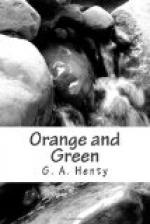During the winter, stores and ordnance arrived from France for the supply of the Irish army, and from England for the use of the British, and a great number of officers from the Continent also joined both armies.
The discontent among the Irish at the apathy of France was extreme. They had embarked in the war on the strength of the promises of King Louis. None of these promises had been fulfilled. The supplies of arms and money had been most meagre, the few thousand troops sent had never taken part in any of the operations, and their coming had been much more than counterbalanced by the troops sent from Ireland in exchange for them. An additional cause of discontent was given by the fact that William exchanged all the prisoners taken in Ireland for Dutch prisoners, in the hands of Louis, and the Irish so handed over were all incorporated in the French army.
So great was the discontent that, had a proclamation of pardon and protection been offered, the whole Irish army would have disbanded, and all resistance ceased. But Louis, alarmed at finding that it was likely William would be freed from his troubles at home, and be at liberty to give his whole attention to the war on the Continent, sent fresh promises of large and speedy aid; and despatched General Saint Ruth to take the command in Ireland, in place of Lauzun, who had returned to France.
This appointment caused fresh discontent among the Irish. Their cause had already been well-nigh ruined by the interference and incapacity of the French generals, and, on the retirement of Lauzun, they had confidently expected that Sarsfield would be appointed commander-in-chief, and that henceforth there would be unity of design in their operations. Saint Ruth was accompanied by a large number of young French officers, whose demeanour still further widened the breach between the French and Irish.
Saint Ruth at once inspected the army, now concentrated between Limerick and Athlone. Except that there was a great deficiency in horses for the cavalry, the army was greatly improved in discipline and appearance since the battle of the Boyne, for both officers, petty officers, and men had learned their duties. The army had passed the winter in comfortable quarters, and had been well supplied with food.
The difficulty was to find horses. The rapparees had carried off many of the chargers of the English cavalry, by stratagem, and it was a common practice of the Danish and other foreign troops to sell their horses to the Irish, at the outposts, and pretend that they were stolen. Still, the supply was altogether insufficient, and Saint Ruth, finding that he could not get horses from the enemy, determined to take them from his friends.
A proclamation was accordingly issued, inviting all the gentry throughout the country held by the Irish, to meet him at Limerick, mounted and accoutered in the best manner. Reports were spread that an important communication was to be made to the gentlemen of the country, from King James, and that many marks of honour and distinction were to be conferred.




